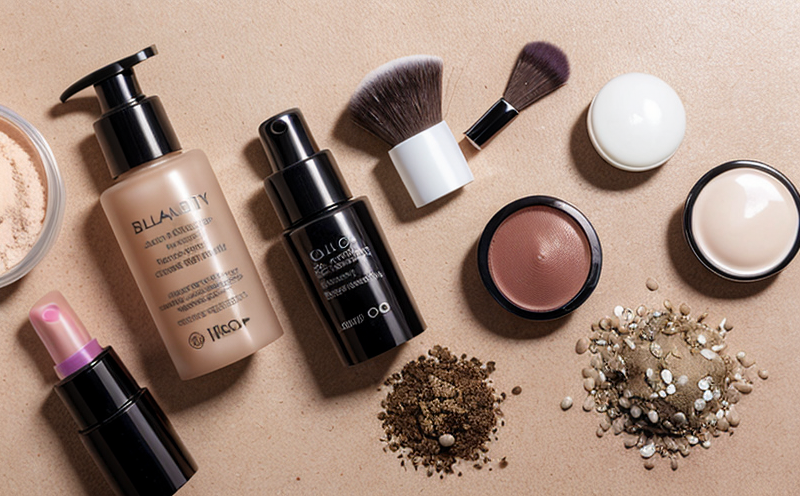Environmental Safety Testing of Cosmetic UV Filters
The environmental safety testing of cosmetic UV filters is a critical component in ensuring that personal care products meet stringent standards set by regulatory bodies and consumer expectations. This service focuses on evaluating the biodegradability, photostability, and overall environmental impact of UV filters used in cosmetics.
UV filters are essential components in sunscreens and other cosmetic products designed to protect consumers from harmful ultraviolet radiation. However, their widespread use raises concerns about potential adverse effects on aquatic ecosystems and human health. Therefore, it is imperative for manufacturers to ensure that these ingredients do not pose risks during production, use, or disposal.
The testing process involves several steps aimed at assessing various aspects of UV filter safety:
- Biodegradability Assessment: This evaluates how quickly the UV filter breaks down in natural environments. A biodegradable compound will decompose within a specified timeframe, reducing its presence in water bodies and minimizing ecological harm.
- Photostability Evaluation: This assesses whether the UV filter remains stable under sunlight exposure, which can affect its efficacy over time. Stable compounds are preferred to maintain effective sun protection throughout product use.
- Toxicity Testing: Conducted using standardized methods outlined in international standards like ISO 10993-2 and OECD guidelines, this determines if the UV filter is toxic to aquatic organisms or poses any other risks when exposed to environmental conditions.
The testing methodology typically includes laboratory simulations of real-world scenarios where the cosmetic product containing the UV filter will be used. This helps predict potential impacts more accurately than relying solely on theoretical models.
For instance, samples may undergo simulated seawater or freshwater exposure tests to mimic conditions found in oceans and rivers. Additionally, soil burial experiments help understand how these ingredients behave after being discarded as waste. These comprehensive evaluations ensure that the UV filters used are both safe for consumers and environmentally friendly.
The results of environmental safety testing play a crucial role in regulatory compliance, product development, and marketing strategies. They provide valuable insights into ingredient selection and formulation adjustments needed to meet sustainability goals while maintaining product quality and performance.
Customer Impact and Satisfaction
The results of environmental safety testing significantly enhance customer satisfaction by addressing their growing concern for personal care products that are environmentally friendly. Consumers increasingly seek out brands committed to sustainable practices, making it essential for manufacturers to offer transparent information about the ingredients they use.
By demonstrating commitment to sustainability through successful environmental safety tests, companies can build strong relationships with their customers and foster loyalty. Moreover, these efforts contribute positively to public perception of the brand, which is crucial in competitive markets.
- Increased Consumer Trust: Demonstrating adherence to strict environmental standards builds trust among consumers who value eco-friendly practices.
- Positive Brand Image: Companies that prioritize environmental safety testing tend to have a more positive brand image, which can attract new customers and retain existing ones.
- Ethical Consumer Appeal: Consumers who are environmentally conscious are more likely to choose products from brands that demonstrate ethical sourcing and manufacturing processes.
Environmental and Sustainability Contributions
By conducting thorough environmental safety testing, laboratories contribute to reducing the negative impact of cosmetic UV filters on aquatic environments. This service supports broader initiatives aimed at promoting sustainability within the cosmetics industry.
The findings from these tests help guide manufacturers towards adopting more sustainable practices, which can lead to significant reductions in pollution levels and improved water quality. Additionally, by selecting safer ingredients early in the product development cycle, companies minimize the need for costly recalls or reformulations later on.
Furthermore, this service supports global efforts to reduce waste and promote recycling through the use of biodegradable materials. It also aligns with broader trends towards circular economies where resources are used efficiently without causing harm to the environment.
Competitive Advantage and Market Impact
Incorporating environmental safety testing into the product development process offers several competitive advantages. Manufacturers that prioritize sustainability often enjoy a first-mover advantage, allowing them to capture early market opportunities while setting industry benchmarks.
This service not only helps meet regulatory requirements but also positions companies as leaders in responsible business practices. By offering transparent information about their products' environmental impact, brands can differentiate themselves from competitors and attract eco-conscious customers who are willing to pay a premium for sustainable options.
The ability to demonstrate compliance with stringent environmental standards enhances brand reputation and can translate into increased market share and profitability. Moreover, early adoption of these practices positions companies ahead of potential regulatory changes that could impose even stricter requirements on the cosmetics industry.





